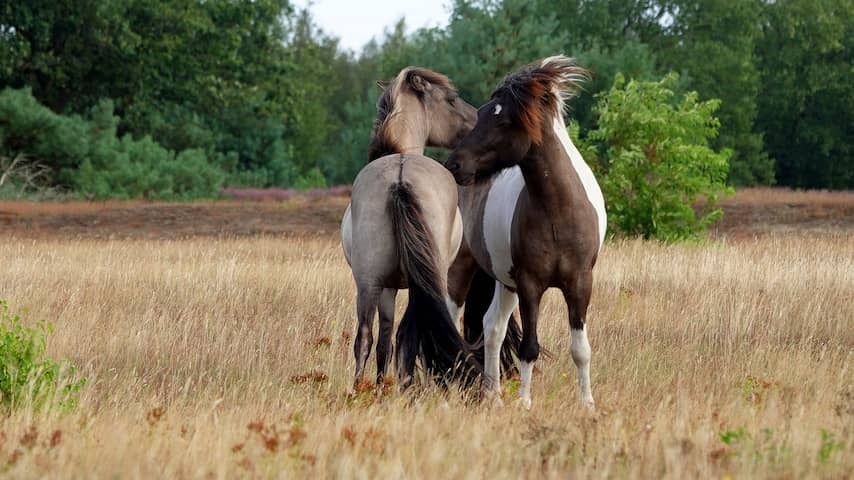
A 38-year-old man appeared in court on Wednesday for bestiality: performing sexual acts with an animal. Why do people do this and what are the consequences for the animal? “I couldn’t touch my horse for a year.”
Ricardo van Z. confessed to abusing a pony eight times. The owner of the animal had discovered this by chance when she viewed security footage. “That was terrible, really disgusting,” she told NH Nieuws. At the end of December, a whole network of animal abuse suspects was already dismantled.
Most people can’t imagine it. What drives such perpetrators?
First of all: we cannot look into the head of the suspect. But in general, there are motives for such behavior. “It often concerns people who have difficulty with contact with people,” sexologist Erik van Beek explains to NU.nl. “They then seek comfort with the animals. Animals cannot indicate whether they like your touches or not. That makes them very vulnerable to sexual interest.”
Often it is a combination of factors, says psychologist and researcher Eveline Schippers. She works at the Waag, a forensic polyclinic within mental healthcare. Among other things, clients are treated there who have exhibited sexually transgressive behavior, such as sex with animals.
“Sexuality often doesn’t run smoothly. Otherwise, the person could have done it in the – for most people – normal way,” says Schippers. “Someone, for example, doesn’t get aroused enough and then seeks out deviant stimuli. Then some people end up with animals.”
Sex with animals has been punishable since 2010
According to Schippers, there are few people who are only interested in sex with animals. “It is often a combination of all kinds of unusual sexual interests. In the treatment room, for example, we regularly see men who, in addition to videos of animal abuse, also watch child abuse.”
Bestiality is sex with animals, but that is different from interest in sex with animals. That’s called zoophilia. Not much research has been done on how often bestiality occurs. But a study of the population of the Czech Republic shows that about 7 percent of men and 4 percent of women there have had fantasies about sex with animals.
“There are an awful lot of people who love animals, but only a very small part of them also see animals as a sexual object,” says Van Beek. “You have people who discover in themselves that they find animals attractive and then go looking for porn. The internet is designed in such a way that the step from one to the other is quite small.”
“A few people need even more extreme stimuli and then end up with bestiality,” says the sexologist. Sex with an animal has only been punishable since 2010. Both committing indecent acts with animals and involvement in animal porn are against Dutch law.
Bestiality has an effect on the mental well-being of the animal
Although animals cannot talk, such abuse has an effect on them that can certainly be noticeable. Laura Venema is an equine behavior therapist and has a horse herself that was sexually abused for the first twenty years of her life. “She grew up with her mother on a farm. The mother was a bit bigger, so the farmer couldn’t get to her properly. That’s why he started using the daughter,” says Venema.
“Since she was a foal, he would lock her up in a barn at night and do his things with her there. In the morning she was only allowed out again. That went on for years.”
The horse was taken away five years ago and has since been in the pasture with the equine behavior therapist. The sexual abuse has had a major impact on the horse’s mental well-being. “She was incredibly anxious and quickly became aggressive. I couldn’t touch her for a year. Then she would attack you.”
Through special training, Venema can now gently pet her horse, as long as she does it very calmly. “But if there is a stranger, and especially a man, she often falls back into that fear and attacks.”
Venema conducts research into equine behavior and sees that this is similar to how people behave after a trauma. “My horse expresses herself with aggression, but I also know many horses that behave closed. And I recognize that in people too. It is of course also a survival mechanism.”
Bestiality is treatable
You can get treatment for bestiality, says Schippers. That can help to prevent similar behavior in the future. “What we are mainly concerned with is learning to control impulses. That can be as simple as counting to ten, but it can also be that you learn to recognize your own triggers.”
According to Schippers, it is also important that the client is clear about the consequences of the behavior. Not everyone knows that. “We try to come to the insight together with them: you don’t want to do this, because it is not nice for the animal and undesirable in society. And it is illegal, so that also creates all kinds of problems for yourself.”